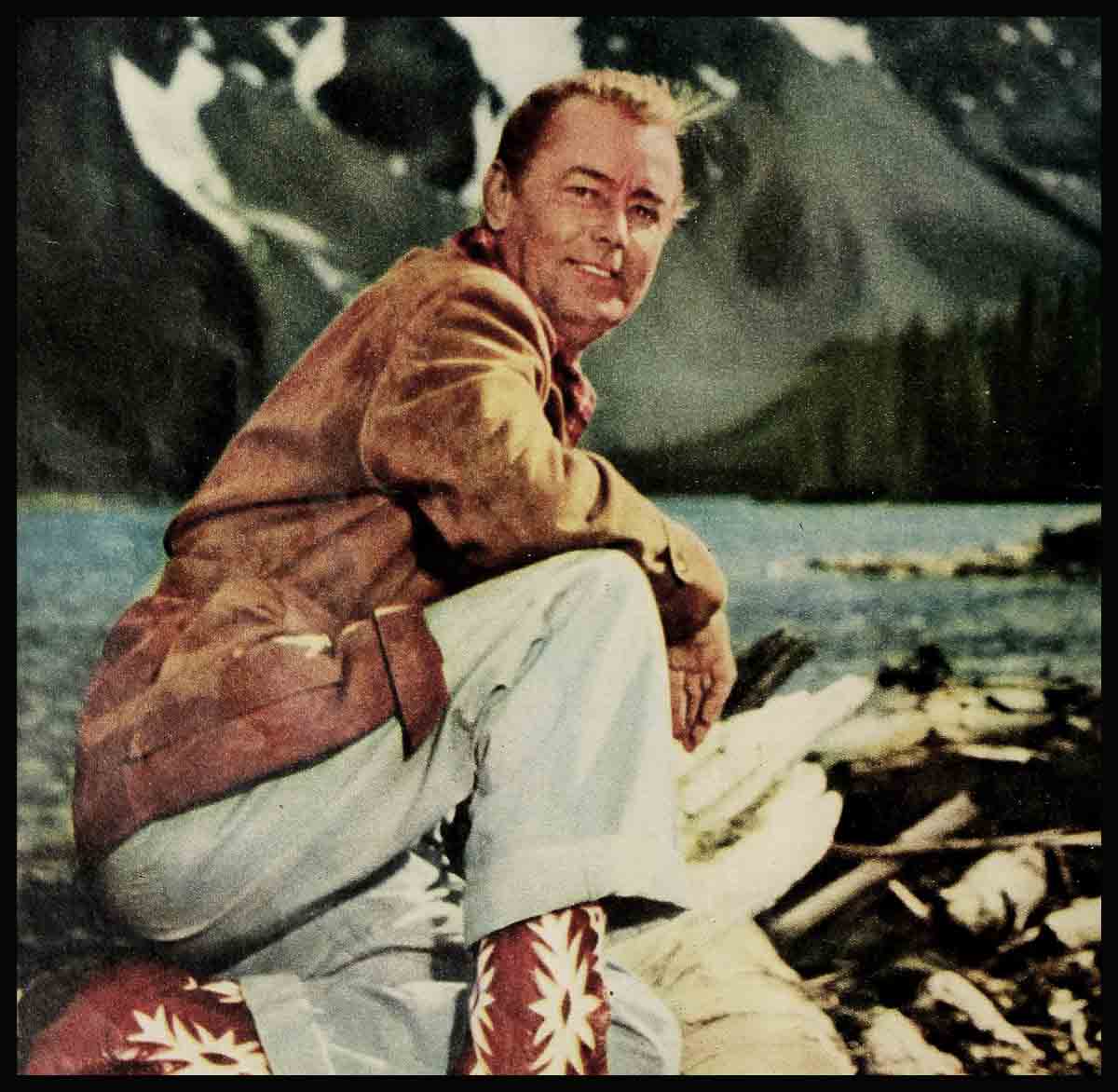
Homesick But Happy—Alan Ladd
In my pursuit of the Alan Ladds, I checked in at the lush and famous Banff Springs Hotel. Getting lost is a hazard in this tremendous castle-like structure which can accommodate 1200 people. Although it was dwarfed by the huge peaks of year-round-snow-capped Mount Rundel, this place is busier than Times Square on a Friday before a long weekend. Eventually, with the aid of a college student—one of a couple of hundred employed during the tourist season—I made the mile-long trek to my room. There, on the door, was a sign that read:
“Bert: We’re waiting for you. Please get in touch.”
When I went downstairs, I found the Alan Ladds in a beautiful oak-paneled room, having dinner with the hotel manager and his friends. Sue threw her arms around me and exclaimed, “Golly, it’s good to see someone from home.” Alan, right behind her, stretched out one sun-tanned paw and gave me a grip of the sort that will break three fingers unless you’re braced for it. “This is some reception,” I said. “What’s to be so excited about?”
“Don’t flatter yourself,” Alan advised. “You’re the first of the Old Guard we’ve seen for a long time.” He handed me the kind of drink that separates the men from the boys.
As we mingled with the guests, I kept a reporter’s eye on Sue and Alan to see whether or not their extended European trip had changed them. I confess that even if I hadn’t liked them for many years—even if I had been looking for trouble—I couldn’t have taken a poke at their behavior. I suppose ten or twenty million words have been written about the Ladds, and I’ve never seen them referred to as “homey people.” Oh, I know that people write a lot about their magnificent home and their still more magnificent ranch. The fact is that Alan is perhaps the richest of the present generation of movie stars, and possibly he is a little dull for reporters, because he never engages in what we refer to as “Errol Flynns.” He stays close to his wife and family. Also, much has been made of the fact that Alan, due to the number of pictures he has made abroad, was partly eligible for the “tax dodge.”
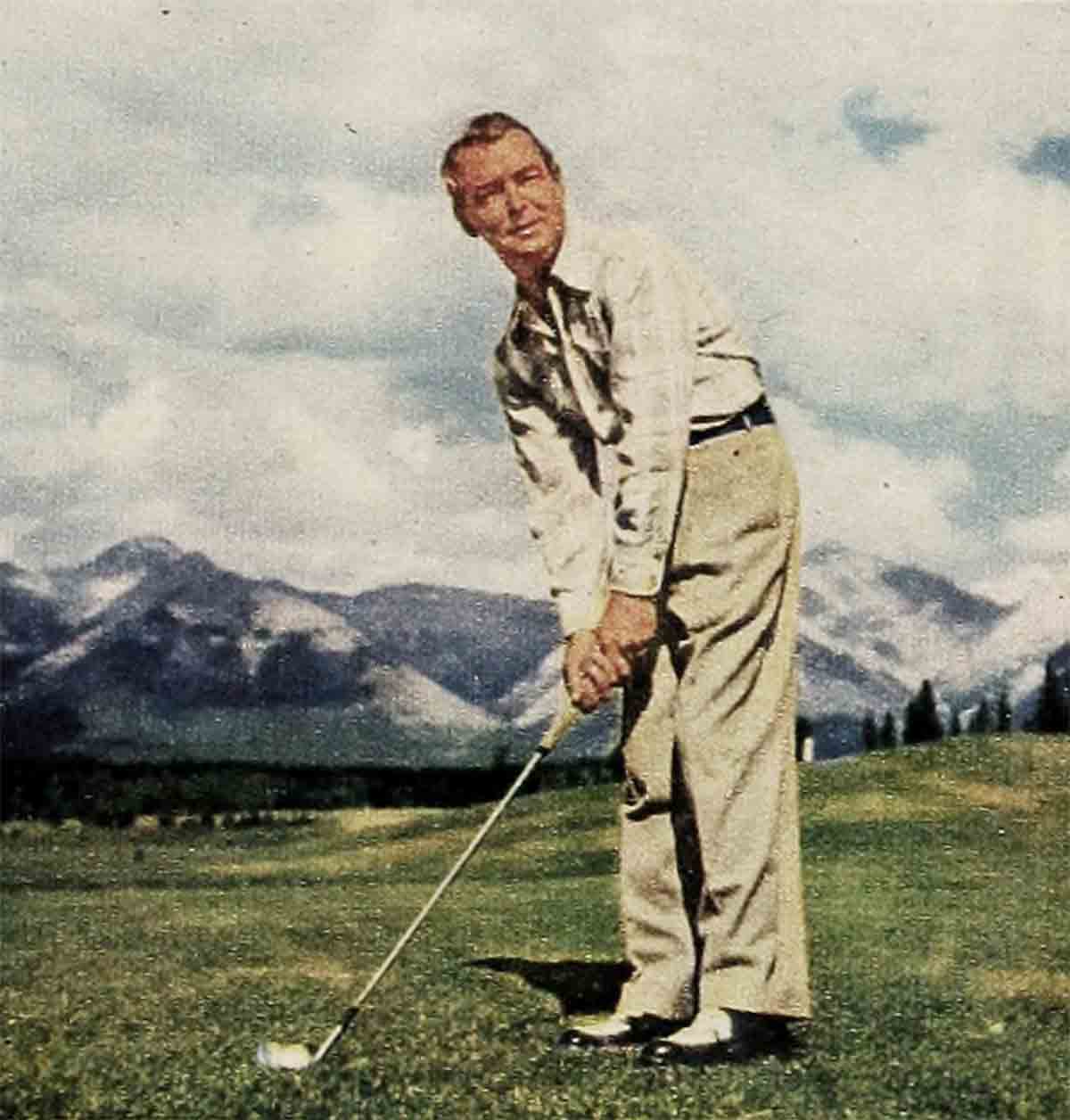
I know these things. Many another reporter-photographer knows them, too. I know that Ladd, like every other star, is open to criticism. Wide open in every move he makes. Yet, here at Banff, in this conservative crowd of people, many of whom had never seen a movie star and had a pardonable antipathy for celebrities, Mr. and Mrs. Ladd got along as though they had known the other guests all their lives.
It was not until I woke up the next morning at ten—with a guilty conscience— that I was aware that Alan was still a movie star, and he was still the same old Alan Ladd. He and Sue never have been the up – and – early – chest – beating type. When I called their room I was given a D.A. (Don’t answer). So I knew that their telephone would be shut off until around noon. Not that they sleep that late. It’s only their way of squeezing in a little private family life before they expose themselves to an admiring, but endless public. As I stepped off the elevator, I saw Alan sneaking through a side corridor, a frisky dachshund tugging ahead on a leash.
He never has been the type to stroll through a lobby to let the people know there’s a movie star around. As a matter of fact, in order to reach Banff Springs, he and Sue had arranged their schedule so that they could leap into a cab (two cabs to be exact) with their family, directly from the Queen Elizabeth, and land on a Canadian Pacific railway car, spending only a half-hour in New York. Alan has more friends among reporters than almost any other star, but he can’t get used to the fact that every move he makes is an event.
“I’ll meet you at one o’clock on the first tee, if you’re not doing anything else,” he said, knowing full well that my camera and I were there only to take pictures of him.
“It’s a date,” I replied, and went into the dining room. A captain came up to me. “Mr. Parry? Mrs. Ladd just called and suggested that you’d better have a big breakfast. She ordered orange juice, wheatcakes and ham and eggs. Will that be satisfactory?”
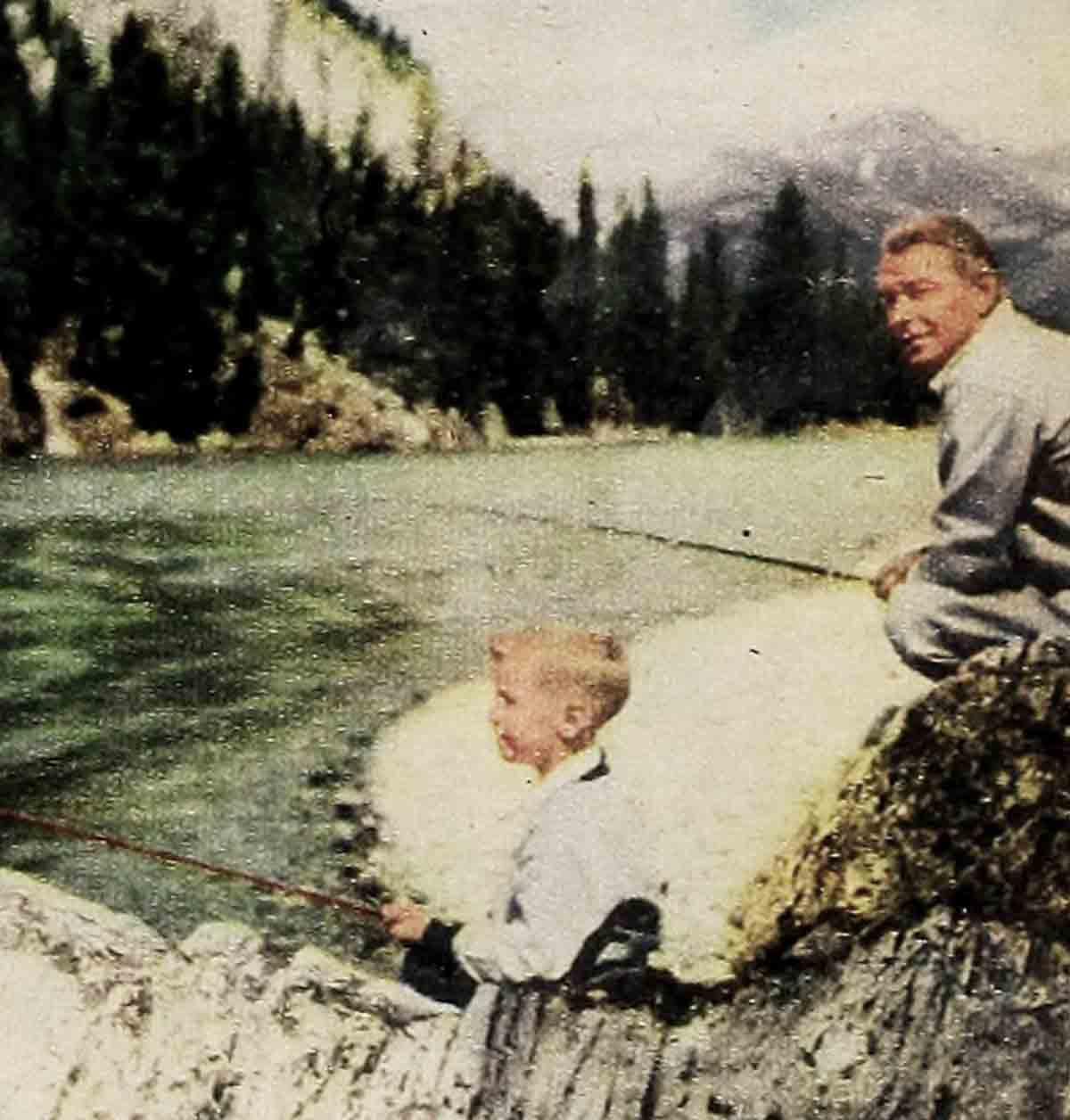
I said it would, realizing that, as always, Sue had automatically adopted me as one of the family. It was a good feeling. I ate the breakfast with considerable relish. And while I was at it, I pondered the talk that Alan and I had fallen into the night before. I think his thousands of friends should know this, too: that for many years Alan had planned his trip to Europe. He is not the type of actor who starts counting his money when he wakes up in the morning. His business manager does that kind of worrying for him. Alan did a couple of pictures in Europe and he’s going back for another one. But he didn’t do these pictures in order to take advantage of the eighteen-month tax exemption. All of his earnings have been impounded by his own business manager, and whatever taxes are to be paid will be paid. Like any other tax payer, if he has a legitimate deduction, hell be grateful for it, and he reserves the right to beef about the amount of taxes he pays, just like the rest of us. But he knows, too, that the movie business has been wonderful to him and to his family. He wants no more, nor less, than what is coming to him.
As I say, Alan Ladd is family. With many another actor the emphasis is on the big “I am.” With Alan, it’s different. He’s not an actor first and a human being second. Thai’s clear enough if you have seen him with Sue and their children, Carol Lee, Laddie, Alana and David. Any of these kids, stripped of the glamour and wealth that surrounds them as children of Alan Ladd, could walk into a schoolyard and “get with it” with a gang in a matter of minutes. They have never been pampered and do not expect any favors.
Only in one department are the Ladds “too soft” in their family relations. They are suckers for their dogs. The boxers and the dachshunds can ruin their gardens, jump through plate glass windows and ruin the rugs with no more punishment than a harsh look. The newest arrival in their canine division is an impudent little hound they’ve named Beret, for the picture, Red Beret. They picked up this important little monster on their European trip, and he acts just like what he is—a German dog with a French name.
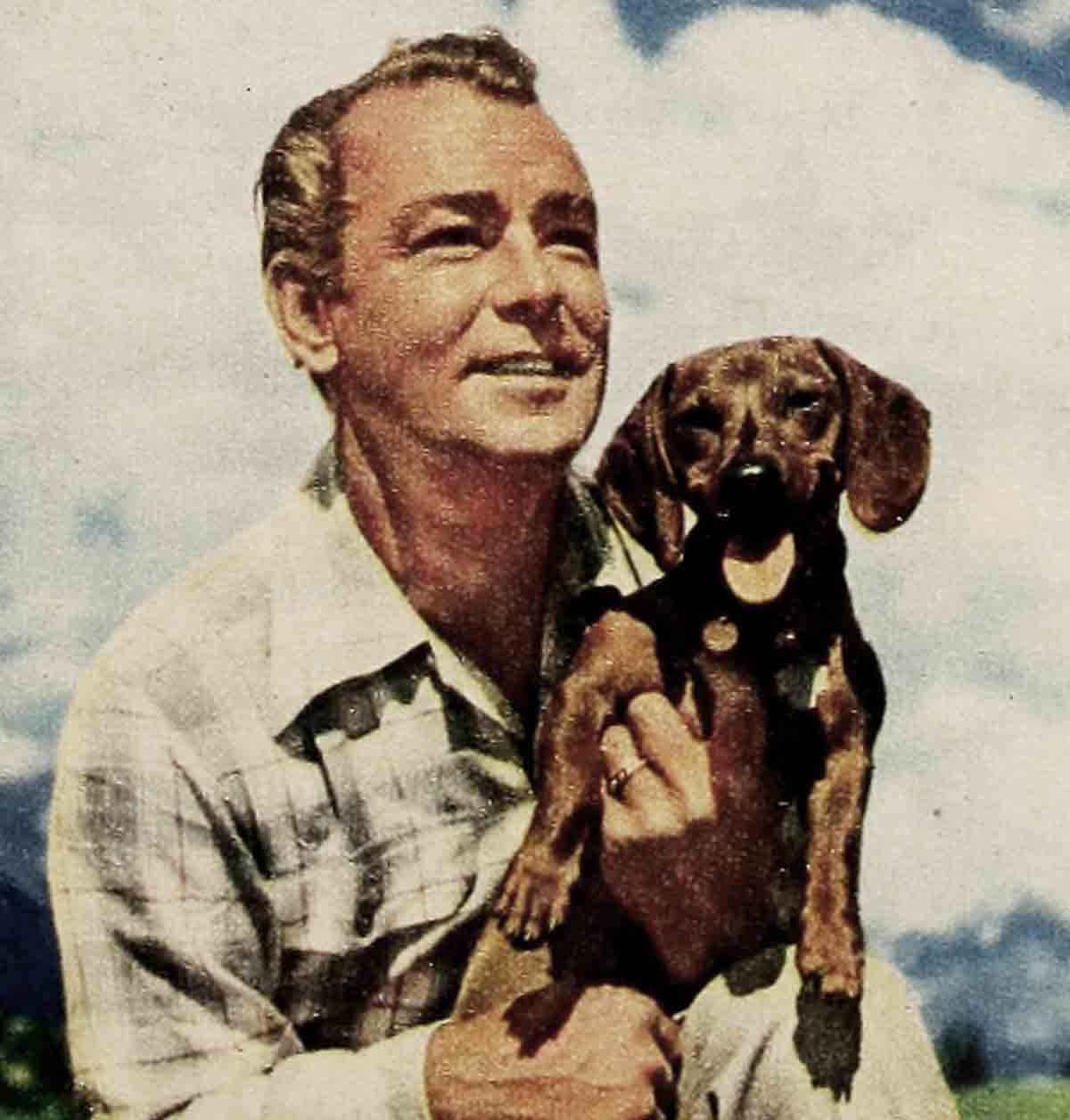
I made Beret’s acquaintance out on the golf course right after breakfast. Alan had been making some practice shots while waiting for me, and Beret was showing how smart he was by retrieving the golf balls. As I arrived on the tee, a young lady was having words with Alan. She flounced away with no small degree of petulance.
“What was all that about?” I asked.
Alan grinned. “That dope, Beret. I hooked out into the next fairway. What did this guy do but run over and bring me back two golf balls. I tried to explain to the lady, but she wouldn’t buy my alibi.”
We settled down for eighteen holes of golf, with Beret tagging along and giving us dirty looks because we wouldn’t let him retrieve every shot we made. Alan played his usual steady game in the middle eighties. “I can’t say I care too much for this course,” he said. “The scenery is so great you can’t keep your eye on the ball, and the grass grows so fast you feel as though you ought to run to the next tee before it’s up to your ears.”
Later, at the nineteenth hole—the one golfers find in the tavern when the game is over—he grew serious. “This trip has been wonderful for my family,” he said. “Long before I earned my first dollar in pictures I thought about having a family and getting around the world a little. I know how many other people spend years saving for a trip, and I wanted my kids to have the experience before they settle down to the serious business of getting an education, working for a living and raising their own families. ’m proud of my kids. They have some special talents, but being an actor’s child can be a handicap, I know. I hope that Sue and I have taught them to meet their problems on a level with everyone else. Sue, like every other mother, has had most of the responsibility, and I think she is doing a tremendously fine and normal job.”
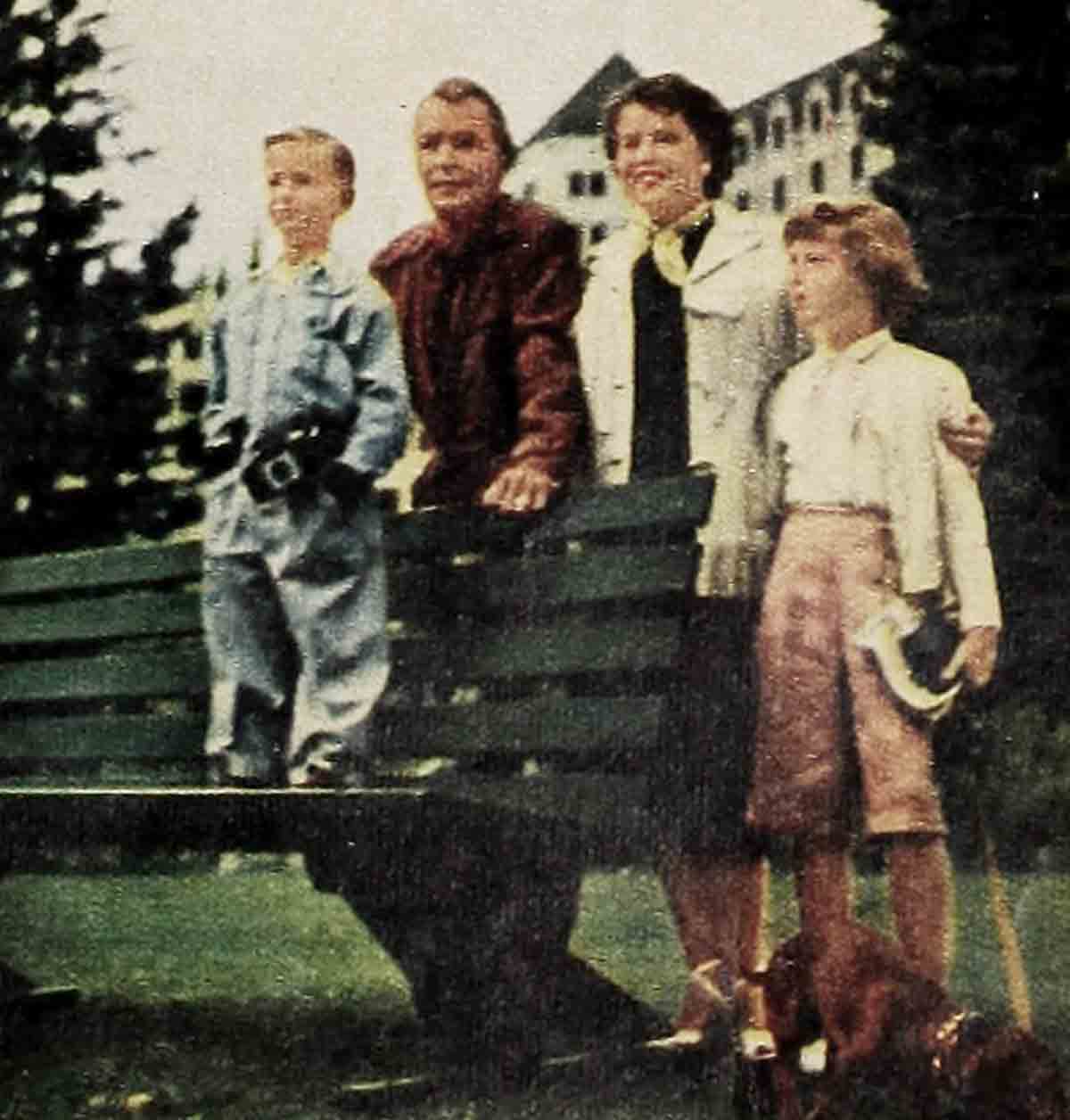
I am not a writer, but as an old friend of the Ladds, I think I can explain them better than most writers. Carol Lee, soon to graduate from her teens, took a year off from college to make this trip. She is second mother to the Ladd children, while Laddie, now fifteen, is the big brother. The only discord I noted was the kind that is normal in all families.
Talking with them, I discovered that theirs was nothing but a “fun trip” through Europe, during which Alan was kidded unmercifully because he couldn’t get used to the foreign food. Everywhere they went, the rest of the family delighted in trying strange dishes in interesting restaurants but Alan kept asking for hamburgers. Despite their jeering that he could get a freight car of them when he got home, Alan finally located a sympathetic chef in Heidelberg, and talked him into preparing hamburger with chili.
“I still think,” Alan told me, “that nothing would perk up those countries like a few chains of motels and hamburger stands.”
On the second evening of our stay at the Banff Springs Hotel, one of the college kids invited the Ladds to their dance. It was held on the ski lift, which was bereft of snow at that time of year. Alan and Sue mingled with the kids and had a wonderful time.
Unfortunately, this is not the best place in the world for fishing. Due to the altitude, or for some other reason, the fish don’t spawn in the multitudes you would expect. Still; Alan and David had a fine time. As Alan explained it, “When a boy and his dad go fishing, it’s not what they catch that matters, it’s the companionship they get out of tossing their lines into the water, talking and being together.”
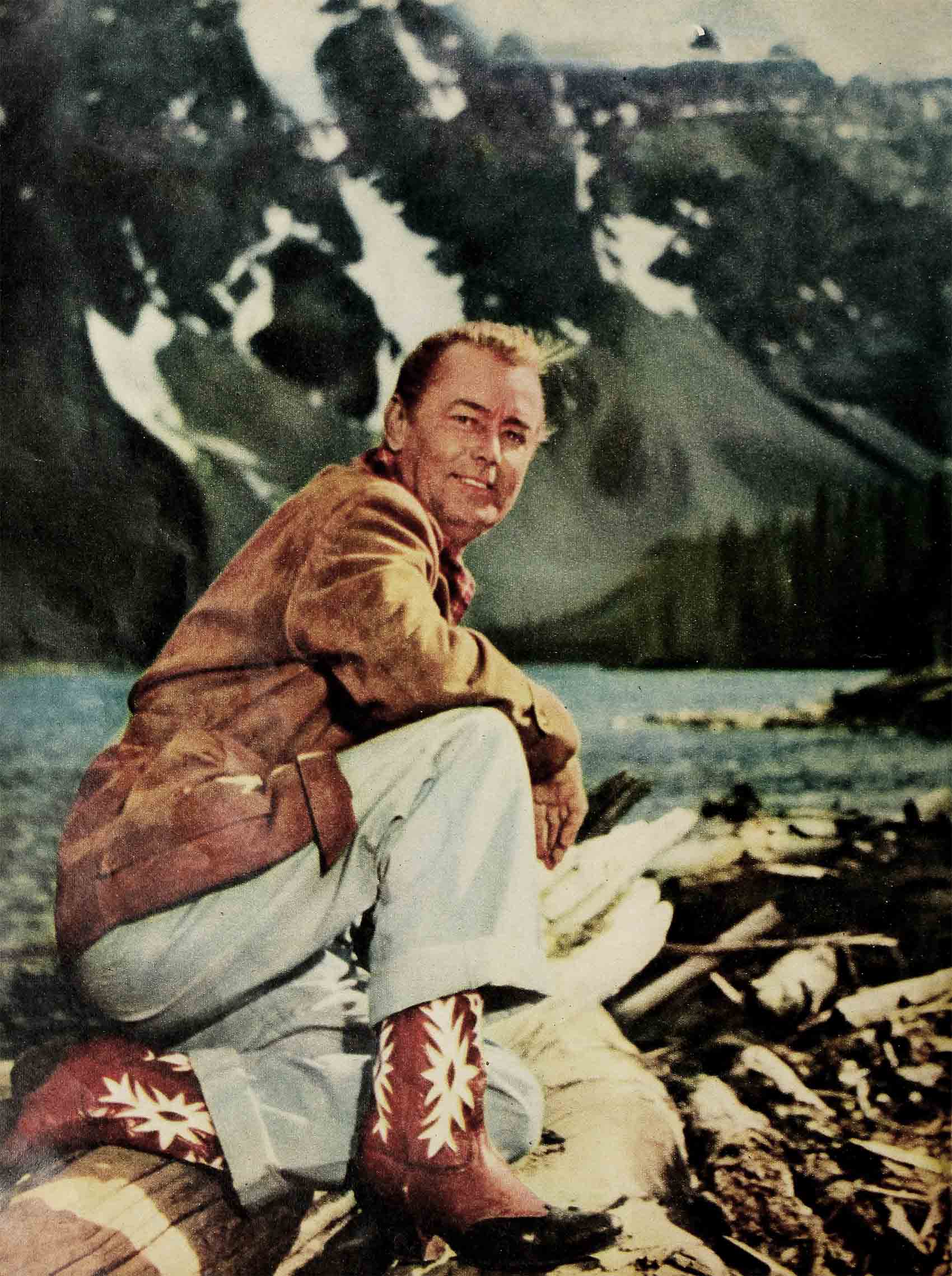
It’s the “being together” that makes the Ladds a great family. Alan Ladd is not put together like the movie star who feels that he is not being “manly” unless he gets away from his family and carries on some minor or serious flirtations with local belles, wherever he goes. Somehow, young people sense the integrity in this man and respect him for it.
We were sitting in the tavern, having a last glass of beer. Outside, the rain poured down in a flood. The tavern keeper came over and said to Alan, “There are a lot of kids outside, waiting for your autograph.”
Quickly Alan replied, “I know there are too many for you to ask them to come in. And if I went outside, they would have to stand around, soaking wet, waiting for me to sign their autographs. Why don’t you ask them all to sign their names, bring them to me and I’ll see that autographs are mailed as soon as I get back to Hollywood.”
The tavern keeper thought that was a considerate plan, so he went out and told the kids.
I don’t have to tell you that Alan kept his promise. He always does. By this time he’s back in Hollywood, and it’s like he said to me: “This trip is the greatest thing that ever happened to us, but we’ve been homesick as the devil, most of the time. We’re happy to be home in Hollywood where we belong.”
THE END
—BY BERT PARRY
(Alan Ladd can be seen in Saskatchewan, a Universal-International picture.)
It is a quote. MODERN SCREEN MAGAZINE NOVEMBER 1953




